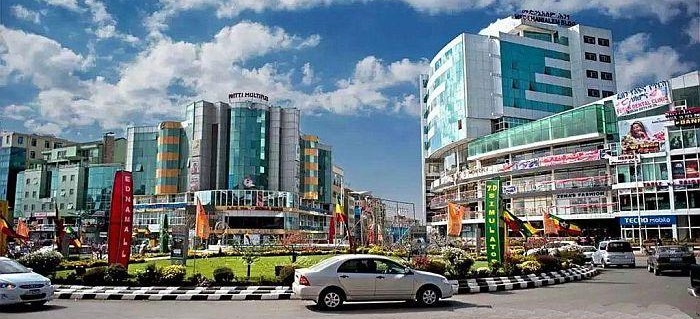
The Driving and Car Rental in Ethiopia
Getting around Ethiopia by car is a popular option amongst tourists who want to see as much of the country as possible.
From the nation’s beautiful natural landscapes, vibrant cities and interesting architecture, there is a great deal to see and do whilst on vacation in Ethiopia, and traveling by car is one of the most convenient ways to do so.
Private vehicles offer greater flexibility when it comes to planning an Ethiopian sightseeing itinerary, with no need to plan the trip around public transport timetables.
Given that an Ethiopian driving permit is required to hire a self-drive vehicle, the majority of tourists without their own car or motorcycle generally opt for a car with a driver. There are many advantages to contracting an expert chauffeur, as explained below.
For those sightseers who are getting behind the wheel in Ethiopia, it is important to be aware of Ethiopian motoring regulations and safety considerations. As rules and road conditions may be different to those found back home, it is essential that tourists are prepared.
Is it safe to drive in Ethiopia?
The principal concern when driving in a foreign country is safety. Provided that motorists take care on the roads and follow standard safety advice they should be able to travel around Ethiopia without any problems.
- Unmarked speed bumps are a common feature
- Drive slowly through towns and villages and look out for people, especially children, playing
- Livestock can often be found on the highway and can cause accidents.
- Avoid driving at night due to the lack of light and the possibility of encountering parked trucks in the road.
Road Conditions in Ethiopia
Roads in Ethiopia are constantly improving and in recent years several stretches have been developed.
In southern Ethiopia routes have become increasingly vehicle-friendly, many areas can now be accessed all year round.
Driving in Addis Ababa is made easier by the many sealed roads linking the Ethiopian capital to major towns and cities.
Paved surfaces are being expanded to the rest of the country, however, travelers should be aware of poorer conditions and potholes, especially in more remote locations.
Special care should be taken when driving during the wet season as heavy rainfall can cause roads to become slippery.
How to Get from the Airport to Addis Ababa City Center
 Given its proximity to Addis Ababa city center, many foreigners choose to take a taxi into town. Depending on traffic, the journey takes around 15 minutes and usually costs between $7 and $10 USD (250-300 Ethiopian Birr).
Given its proximity to Addis Ababa city center, many foreigners choose to take a taxi into town. Depending on traffic, the journey takes around 15 minutes and usually costs between $7 and $10 USD (250-300 Ethiopian Birr).
Relatively inexpensive and convenient, taxis are a good option for people who are new to the city.
Another option is to use the Addis Ababa minibus service. This is the least expensive form of transportation with short trips priced under $0.10 (3 ETB). There is a minibus station positioned just outside the terminal building with buses to and from the city center available all day.
Travelers who are planning to explore Ethiopia by car may choose to hire a vehicle. Foreign nationals should be aware that International Driving Permits are not valid for driving in Ethiopia, instead, a local license is required to rent a car.
Airlines at Addis Ababa Bole Airport
The main airline operating out of Addis Ababa Bole International Airport is Ethiopian Airlines, flying to around 125 domestic and international destinations.
Other airlines at Bole airport are as follows:
Other airlines at Bole airport are as follows:
- Air China
- Air India
- Asiana Airlines
- Egyptair
- Emirates
- Gulf Air
- Kenya Airways
- Lufthansa
- Oman Air
- Qatar Airways
- SAS
- Saudi Arabian Airlines
- Shenzhen Airlines
- Singapore Airlines
- South African Airways
- Sudan Airways
- Turkish Airlines
- Yemenia Yemen Airways
- Flydubai
Services and Facilities at Ethiopia’s ADD
Facilities are available for the convenience of the millions of passengers who pass through the terminals each year.
Travelers should find everything they need to make their journey comfortable and enjoyable including:
- Several restaurants serving hot food
- Places to buy coffee and snacks
- Duty-free shops selling souvenirs and last-minute essentials etc.
- Currency exchange desk
- First aid station
- Bank
- Information desks
- Wheelchair hire stand
- Free WiFi
Lounges and VIP services at Ethiopia’s main airport
Both terminals at Addis Ababa Bole International Airport have lounges where passengers can wait for a flight or relax during a layover.
Terminal 1: Ethiopia Airlines ShebaMiles Lounge
- Opening hours: 5 am to midnight
- Services: Premium food offering, WiFi, newspaper and magazines
Terminal 2: Ethiopia Airlines Cloud Nine Lounge I and II
- Opening hours: 24 hours
- Services: Premium food and beverages, WiFi, television, printers, newspapers and magazines
Terminal 2: Etiopian Airlines Star Alliance Gold Lounge
- Opening hours: first to last departure of the day
- Services: premium food and snacks, WiFi, television, newspapers and magazines
Is Addis Ababa Bole International Airport Safe?
Bole Airport is a safe place for travelers provided they follow the standard security advice.
Luggage should not be left unattended at any time, bags are likely to be confiscated by staff if left alone. A lost property service is in operation to reclaim misplaced personal belongings.
Addis Ababa airport can get very busy, especially during peak times. Families should keep young children in sight at all times so that they don’t become lost in the crowds.
Information desks and first aid stations are distributed throughout the terminals should they be required.
Hotels in and around Addis Ababa Airport
Anyone with a lengthy layover or catching a flight very early in the morning may need to find a place to sleep at Addis Ababa airport.
Bole Skygate Hotel is just 500 meters away with a free shuttle service. The hotel has a restaurant and serves breakfast. Double rooms are available from around $40 a night.
There are several other hotels within 10 minutes of the airport, prices can be compared online and booking in advance is advised.
Where can I sleep inside Addis Abada Airport?
Whilst there are no designated sleeping areas, there is some comfortable reclining seating suitable for taking a nap. One of the VIP lounges is also open overnight.
Bole airport is open 24 hours and passengers are able to spend the night there without issues. Food and drink services are only available during the day and early evening.
Passengers may need an Ethiopian transit visa if they have a stopover which exceeds 12 hours or wish to leave the airport.
Immigration and Customs at Addis Ababa Airport
Foreigners must ensure they have all the required documents to travel to Ethiopia including, in the majority of cases, a visa. Only citizens of Djibouti and Kenya can enter the country visa-free.
Most travelers apply for the Ethiopia eVisa before departure to avoid lines and delays at the airport. The eVisa is presented along with the passport on arrival in Addis Ababa.
Import regulations are as follows:
- 400 cigarettes or 250 grams of tobacco
- 2 liters of alcoholic beverages
- 600 milliliters of perfume
An unlimited amount of foreign currency can be brought into Ethiopia but it must be declared.
It is also recommended visitors check the required vaccines for Ethiopia well in advance. People arriving from a country affected by Yellow Fever may be required to provide a Yellow Fever certificate.






 |
|  |
|  |
|  |
| 